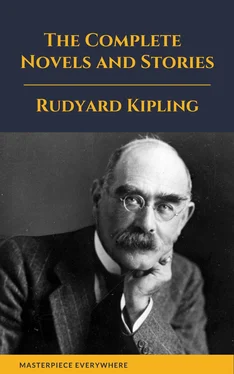‘Thou art not, that I can see; but I do not know that other. He marches well, though.’
The first freshness of the day carried the lama forward with long, easy, camel-like strides. He was deep in meditation, mechanically clicking his rosary.
They followed the rutted and worn country road that wound across the flat between the great dark-green mango-groves, the line of the snow-capped Himalayas faint to the eastward. All India was at work in the fields, to the creaking of well-wheels, the shouting of ploughmen behind their cattle, and the clamour of the crows. Even the pony felt the good influence and almost broke into a trot as Kim laid a hand on the stirrup-leather.
‘It repents me that I did not give a rupee to the shrine,’ said the lama on the last bead of his eighty-one.
The old soldier growled in his beard, so that the lama for the first time was aware of him.
‘Seekest thou the River also?’ said he, turning.
‘The day is new,’ was the reply. ‘What need of a river save to water at before sundown? I come to show thee a short lane to the Big Road.’
‘That is a courtesy to be remembered, O man of good will; but why the sword?’
The old soldier looked as abashed as a child interrupted in his game of make-believe.
‘The sword,’ he said, fumbling it. ‘Oh, that was a fancy of mine—an old man’s fancy. Truly the police orders are that no man must bear weapons throughout Hind, but’—he cheered up and slapped the hilt—‘all the constabeels hereabout know me.’
‘It is not a good fancy,’ said the lama. ‘What profit to kill men?’
‘Very little—as I know; but if evil men were not now and then slain it would not be a good world for weaponless dreamers. I do not speak without knowledge who have seen the land from Delhi south awash with blood.’
‘What madness was that, then?[’]
‘The Gods, who sent it for a plague, alone know. A madness ate into all the Army, and they turned against their officers. That was the first evil, but not past remedy if they had then held their hands. But they chose to kill the Sahibs’ wives and children. Then came the Sahibs from over the sea and called them to most strict account.’
‘Some such rumour, I believe, reached me once long ago. They called it the Black Year, as I remember.’
‘What manner of life hast thou led, not to know The Year? A rumour indeed! All earth knew, and trembled.’
‘Our earth never shook but once—upon the day that the Excellent One received Enlightenment.’
‘Umph! I saw Delhi shake at least; and Delhi is the navel of the world.’
‘So they turned against women and children? That was a bad deed, for which the punishment cannot be avoided.’
‘Many strove to do so, but with very small profit. I was then in a regiment of cavalry. It broke. Of six hundred and eighty sabres stood fast to their salt—how many think you? Three. Of whom I was one.’
‘The greater merit.’
‘Merit! We did not consider it merit in those days. My people, my friends, my brothers fell from me. They said: “The time of the English is accomplished. Let each strike out a little holding for himself.” But I had talked with the men of Sobraon, of Chillianwallah, of Moodkee and Ferozeshah. I said: “Abide a little and the wind turns. There is no blessing in this work.” In those days I rode seventy miles with an English mem-sahib and her babe on my saddle-bow. (Wow! That was a horse fit for a man!) I placed them in safety, and back came I to my officer—the one that was not killed of our five. “Give me work,” said I, “for I am an outcast among my own kin, and my cousin’s blood is wet on my sabre.” “Be content,” said he. “There is great work forward. When this madness is over there is a recompense.”’
‘Ay, there is a recompense when the madness is over, surely?’ the lama muttered half to himself.
‘They did not hang medals in those days on all who by accident had heard a gun fired. No! In nineteen pitched battles was I; in six-and-forty skirmishes of horse; and in small affairs without number. Nine wounds I bear; a medal and four clasps and the medal of an Order, for my captains, who are now generals, remembered me when the Kaiser-i-Hind had accomplished fifty years of her reign, and all the land rejoiced. They said: “Give him the order of Berittish India.” I carry it upon my neck now. I have also my jaghir (holding) from the hands of the State—a free gift to me and mine. The men of the old days—they are now Commissioners—come riding to me through the crops,—high upon horses so that all the village sees,—and we talk out the old skirmishes, one dead man’s name leading to another.’
‘And after?’ said the lama.
‘Oh, afterwards they go away, but not before my village has seen.’
‘And at the last what wilt thou do?’
‘At the last I shall die.’
‘And after?’
‘Let the Gods order it. I have never pestered Them with prayers: I do not think they will pester me. Look you, I have noticed in my long life that those who eternally break in upon Those Above with complaints and reports and bellowings and weepings are presently sent for in haste, as our colonel used to send for slack-jawed down-country men who talked too much. No, I have never wearied the Gods. They will remember this, and give me a quiet place where I can drive my lance in the shade, and wait to welcome my sons: I have no less than three—ressaldar-majors all—in the regiments.’
‘And they likewise, bound upon the Wheel, go forth from life to life—from despair to despair,’ said the lama below his breath, ‘hot, uneasy, snatching.’
‘Ay,’ the old soldier chuckled. ‘Three ressaldar-majors in three regiments. Gamblers a little, but so am I. They must be well-mounted; and one cannot take the horses as in the old days one took women. Well, well, my holding can pay for all. How thinkest thou? It is a well-watered strip, but my men cheat me. I do not know how to ask save at the lance’s point. Ugh! I grow angry and I curse them, and they feign penitence, but behind my back I know they call me a toothless old ape.’
‘Hast thou never desired any other thing?’
‘Yes—yes—a thousand times! A straight back and a close-clinging knee once more; a quick wrist and a keen eye; and the marrow that makes a man. Oh, the old days—the good days of my strength!’
‘That strength is weakness.’
‘It has turned so; but fifty years since I could have proved it otherwise,’ the old soldier retorted, driving his stirrup-edge into the pony’s lean flank.
‘But I know a River of great healing.’
‘I have drank [drunk] Gunga-water to the edge of dropsy. All she gave me was a flux, and no sort of strength.’
‘It is not Gunga. The River that I know washes from all taint of sin. Ascending the far bank one is assured of Freedom. I do not know thy life, but thy face is the face of the honourable and courteous. Thou hast clung to thy Way, rendering fidelity when it was hard to give, in that Black Year of which I now remember other tales. Enter now upon the Middle Way, which is the path to Freedom. Hear the Most Excellent Law, and do not follow dreams.’
‘Speak then, old man,’ the soldier smiled, half saluting. ‘We be all babblers at our age.’
The lama squatted under the shade of a mango, whose shadow played checkerwise over his face; the soldier sat stiffly on the pony; and Kim, making sure that there were no snakes, lay down in the crotch of the twisted roots.
There was a drowsy buzz of small life in hot sunshine, a cooing of doves, and a sleepy drone of well-wheels across the fields. Slowly and impressively the lama began. At the end of ten minutes the old soldier slid from his pony, to hear better as he said, and sat with the reins round his wrist. The lama’s voice faltered—the periods lengthened. Kim was busy watching a gray squirrel. When the little scolding bunch of fur, close pressed to the branch, disappeared, preacher and audience were fast asleep, the old officer’s strong-cut head pillowed on his arm, the lama’s thrown back against the tree bole, where it showed like yellow ivory. A naked child toddled up, stared, and, moved by some quick impulse of reverence, made a solemn little obeisance before the lama—only the child was so short and fat that it toppled over sideways, and Kim laughed at the sprawling, chubby legs. The child, scared and indignant, yelled aloud.
Читать дальше












